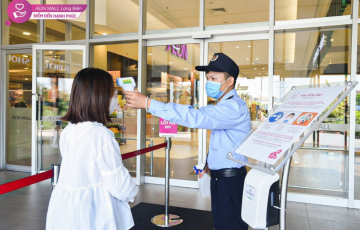On April 3, the Government Office issued a document guiding clearly the cases that are really necessary to go out to strictly implement social isolation under the Prime Minister’s Directive No. 16 to minimize the risk of infection. community.
The document stated on March 31, the Prime Minister issued Directive No. 16 / CT-TTg on urgent measures to prevent and control COVID-19 epidemic. The branches, levels and localities have seriously implemented in accordance with the direction of the Prime Minister. However, some contents of the Directive have been not yet understood and implemented consistently.
Prime Minister Nguyen Xuan Phuc requested:
1. Strictly implementing social isolation in accordance with the requirements of Directive No. 16 / CT-TTg, ensuring social separation, keeping distance between people and communities. In order to minimize the risk of community infection, everybody has to stay at home and minimize to outside, except when really necessary:
a) Buying food, foodstuff, pharmaceuticals and other essential goods and services;
b) Emergencies such as emergency, medical examination and treatment; natural disasters, fires, …
c) Working at agencies, state units, armed forces, diplomatic agencies and facilities mentioned in Section 2 of this document.
In case of leaving the house, everybody must wear a mask, wash their hands with soap or disinfectant solution; do not gather more than 2 people in public places outside the workplace, school, hospital and must keep a minimum distance of 2 meters.
2. Factories and production establishments; traffic and construction works; business establishments providing services and essential goods (such as food, food, medicine; petrol, oil; electricity; water; fuel, …); educational institutions, banks, treasuries, service-providing establishments directly related to banking activities and business supplements (such as notaries, lawyers, registry, registration of secured transactions. ..), securities, post, telecommunications, support services for transport, export, import of goods, medical examination, treatment, funeral … are allowed to continue operating. The heads of the above-said facilities are responsible for ensuring absolute safety and fully implementing anti-epidemic measures, including:
a) Strictly implement the mask-wearing, fully arrange facilities and materials to prevent and fight against epidemics according to regulations and recommendations of the health agencies;
b) Request workers to declare health, comply with measures to restrict movement, contact and communication;
c) Temporarily suspend non-urgent activities, reduce the concentration of workers;
d) Organize and strictly manage the transportation of workers (if any) to the workplace to prevent risks of disease transmission.
In case of failing to meet the above requirements, the operation must be stopped. Local health agencies shall guide, inspect and supervise the prevention and control of epidemics at the above-said establishments.
Chairpersons of provincial-level People’s Committees shall decide and publicize the types of production, business and works establishments that must temporarily suspend operations.
3. Basically stopping activities of transporting public passengers, except for cases of public duty, shuttle buses for workers, experts, isolated people, vehicles transporting production raw materials and goods. Minimize the operation of personal vehicles.
Ensure smooth operation of goods and raw materials for production. Localities immediately abolish measures to stop and prohibit people and vehicles from going to their localities not in accordance with Directive No. 16 / CT-TTg.
4. Heads of agencies, units, organizations and enterprises shall have to organize work at home in accordance with their specific conditions, without delaying work, especially on temporary jobs. limitations, the statute of limitations as prescribed by law, public services serving people and businesses.
5. Concerned ministries, agencies and localities shall proactively adjust epidemic prevention and control measures, ensuring their compliance with the above-mentioned contents; coordinate and solve problems arising according to its competence; strictly deal with violations; promptly report to the Prime Minister on arising problems.
(According to the Employee)







